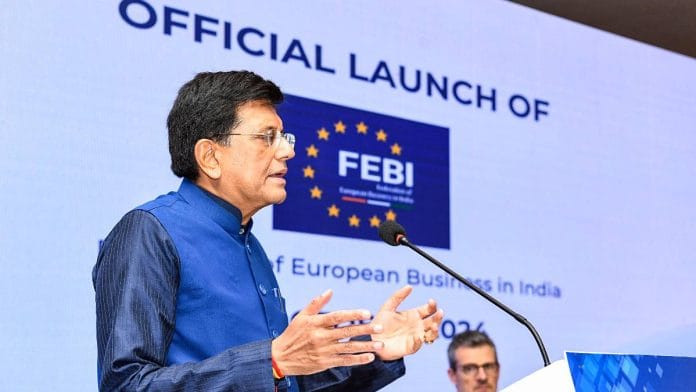New Delhi: Progress in negotiations between India and the European Union (EU) for a Free Trade Agreement (FTA) has been marginal, with “irrational standards” set by the multilateral bloc that are acting as non-tariff barriers for Indian companies, Piyush Goyal, Union Minister for Commerce and Industry, has said.
Speaking at the launch of the Federation of European Businesses in India (FEBI) in New Delhi Friday, Goyal highlighted the difference in positions between the two sides, especially surrounding labour laws in the EU, and the introduction of a number of new regulations by the bloc, including those surrounding deforestation and the carbon border adjustment mechanism (CBAM), due to come into force soon.
“I have companies that come to me and say we have an unviable operation but we are not able to close down that operation in an EU state because the government is not only not cooperating but actually creating hurdles in our business,” Goyal said.
“We have the same problem on standards, where irrational standards are set up by the EU, which act as a barrier to expanding trade between India and the EU. We have people coming and telling us about significant unfair trade practices on the European side,” he added.
Goyal urged for Indian businesses to be able to join the FEBI, a new chamber of commerce launched by the delegation of the EU to India, with members from all 27 member-states of the union.
The minister’s “frank” remarks come mere weeks after the two sides concluded the ninth round of discussions on the FTA, held in New Delhi between 23 and 27 September.
The FTA negotiations, which had started for the second time in 2022, had seen a lot of positive momentum in the early days.
In December 2023, EU ambassador to India Hervé Delphin had told ThePrint that he was “confident of reaching an agreement” with India.
“What we are seeing now is two sides really committing and engaging in negotiations, which is a very comprehensive one and therefore a very difficult one by its very nature. It is an agreement which is very consequential for both sides,” he had said.
“I think at this point in time, there is momentum in the negotiations—there are issues to be addressed. I think both sides have to adjust. We are confident that both sides will come and reach an agreement,” he added.
However, Delphin said Friday at the launch of the FEBI that “despite the best efforts of the negotiating teams, progress has been marginal. Fundamental differences are yet to be overcome”.
“Both sides have to re-calibrate. Don’t get me wrong! Recalibrating does not mean aiming at a cheap, low-cost version of an FTA. Interest for both sides should be a meaningful FTA. Both sides must reflect on potential packages of mutual concessions, which would see both parties move into trade policy territory where they have never ventured so far,” he asserted.
The EU, which as a bloc is one of India’s largest trading partners in goods, accounts for roughly 12 percent of New Delhi’s total trade, with roughly 4,500 companies providing employment to 1.7 million Indians directly.
However, an FTA between the two countries remains distant for the time being, especially as negotiations for an agreement originally began in 2007 between the two sides.
Also Read: 5-year, multi-entry Schengen visa on the cards for Indian travellers as EU adopts new rules
Trade barriers
For Goyal, EU’s new environmental regulations are “disrespecting the agreement we all entered into in Paris” in 2016, where nations came together and agreed to a principle of “common but differentiated responsibilities”.
“The very premise [of the Paris Accords] is sought to be demolished by the EU bringing in new elements in the trading relationship. For five or six years now, we have only been negotiating irrational duties, totally against the MFN (Most Favoured Nation) law of the World Trade Organization, which we all agreed to respect on Indian steel,” said Goyal.
The MFN principle is a founding principle of the WTO that requires members to treat all other members equally.
The commerce minister sought to defend India’s trade practices, pointing out that EU’s duties will not be “conducive” for development of business ties between the two sides.
At the political level, there seems to be strong will for a trade deal to come to fruition, however, it seems that the gap in policies continues to be wide between EU and India.
On 9 October, Union Finance Minister Nirmala Sitharaman hit out at the EU’s introduction of CBAM, which is expected to come into force on 1 January, 2026.
CBAM is a border tax the EU is introducing on seven energy-intensive sectors, including steel, cement, fertilisers and engineering goods.
Speaking at a summit organised by Financial Times, Sitharaman pointed out that the carbon tariffs would hurt Indian exports to the EU, as they would act as a trade barrier for exporters.
However, with the launch of FEBI, both the Indian side and the EU delegation are hoping it would help intensify business links. Up until now, each of the EU member states, if at all, had their own business chambers, while international trade remained the sole competence of the EU Commission.
The new business chamber has been launched with 100 members, with Volvo the newest one to join.
(Edited by Nida Fatima Siddiqui)







idiotic bureaucratic EU idiots want zero tariff for eu products but want to impose non tariff barriers and want to impose 30 to 40 % tariff using EUDR and CBAM mechanism , the fools think that india will accept such a ridiculous deal lol
Poor, socialist India is allergic to free trade.